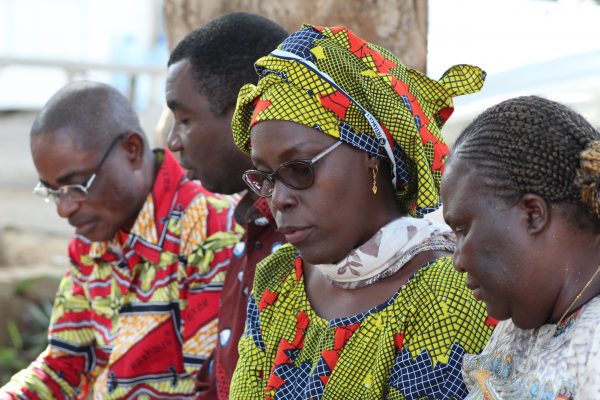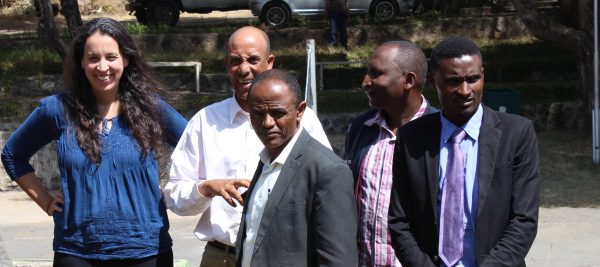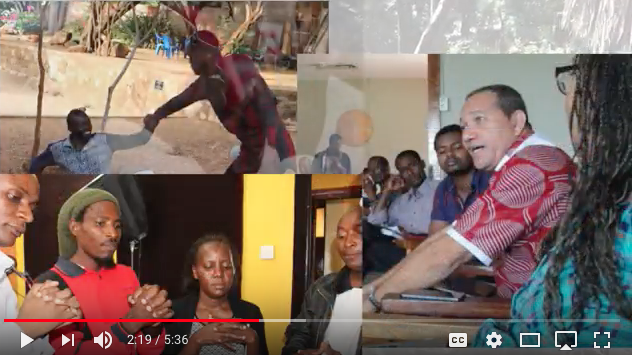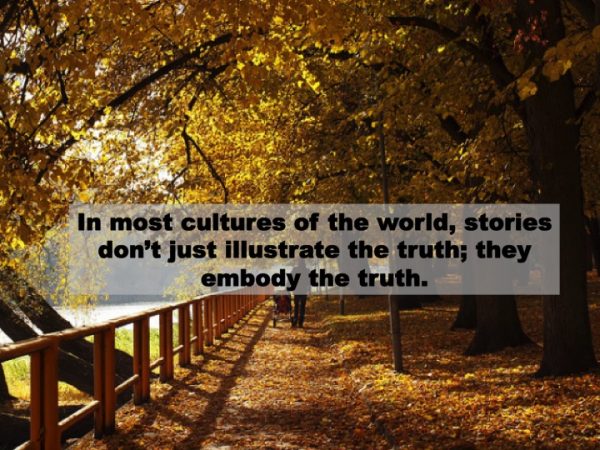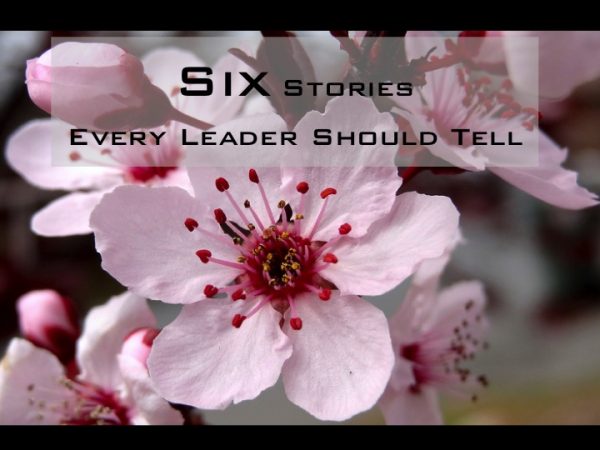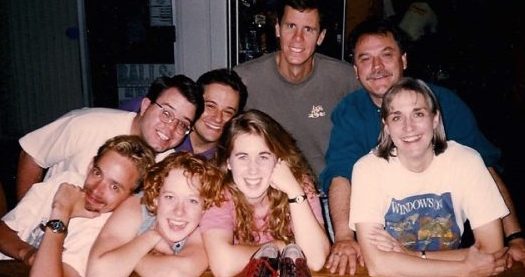Freedom to Lead International® (FTL) provides leadership development services to leaders in 50 countries throughout South Asia, Africa, and North America. We specialize using methodologies that engage leaders who are more likely to be influenced through oral-based methods (stories, images, drama, poetry, music, etc.) rather than through abstract theory or concepts. We call these people “storycentric communicators.” This video outlines some of the secular research, science, and cultural anecdotes behind this story-based methodology for adult learning. It challenges people in western cultures to realize the power of story, perhaps seeing that this story-based approach is for all of us. Transcript: The Power of Storytelling (Rick Sessoms:) Freedom to Lead International® is a 501(c)(3) nonprofit entity that provides leadership development services to leaders in South Asia, across Africa, and in the US. We specialize in using methodologies that engage leaders who prefer and are more likely to be influenced through oral-based methods rather than through abstract theory or concepts. We call these people “storycentric communicators.” The oral-based tools we use include stories, images, drama, dance, poetry, and music. We call these methods the “storycentric arts.” Think about a story you’ve heard that had an impact on you. Why did that story impact you? Several years ago, my wife and I visited Broadway to see the musical Wicked. This show is a prequel to The Wizard of Oz. It tells the story of Elphaba, the Wicked Witch of the West, and her early history in the land of Oz. Elphaba
Read moreOrganizations in virtually every sector have access to data that can offer an advantage for developing new products, helping coworkers reach their potential, and improving customer experience. Companies on average manage three times more data than they did five years ago. Many organizational leaders devote valuable time diving into these pools of data searching for patterns, problems, or potential opportunities. This analytical work can be energizing when it reveals nuggets of information to gain a competitive edge. But leaders who know how to communicate their relevant data through a story structure have better odds of convincing others to take action.
Read moreThe organization I lead generates a bunch of data. We provide leadership development in under-resourced populations, so we have data about the number of leaders that are engaged in our programs. We have data about the number of events we conduct each quarter. We have cool data about the impact of our services on leaders. But when we began telling “Jairus’ story” to our stakeholders, the data has found a voice.
Read more“Could it be that orality is not about literacy at all?”
Six years later, this is what I have learned from experiencing it as a practitioner:
“No, orality is not about literacy. It’s not about literacy at all. Orality is about STORY.”
In fact, we at Freedom to Lead believe in this so strongly that we use the word “storycentric” to describe the cultures we work with. We recognize that “orality” has connotations- real or perceived – that can cause confusion. But it is story that captures the heart of both the nonliterate and the literate. It is both biblical stories and current, personal life stories that inspire all people to embrace the God of the Bible.
Read moreI think I’ve been getting it wrong all these years. Since that time two millennia ago in Antioch when followers of the Way were first called Christians, the church has carried God’s mission to the world. Evangelism and discipleship methods have varied over the centuries and the local church’s involvement in the advancement of the kingdom of God has looked different from culture to culture and has changed with the times. During the last decade, for example, there has emerged this new term in missiological communities called “orality.” Orality methods are essentially methods of evangelism and discipleship that involve oral-based communication like story, drama, music, and the arts to portray the gospel rather than linear, abstract, literate-based communication that has been done since the invention of the printing press. Missions groups have been recently saying that they would like to begin using orality methods for peoples and cultures that cannot or do not read. The tried-and-true literate-based methods would still be used for peoples and cultures that do read. At least that’s what I thought they were saying.
Read moreOn a day filled with expectation, Jesus made His way to Jerusalem. His followers believed the Kingdom was about to be reborn. Those marching with Jesus had seen him raise Lazarus from the dead a few days before. You can understand their excitement. Along the parade’s path, crowds were shouting praises and dancing and singing, escorting Jesus on His “triumphal entry.”
“Hosanna!” they sang, “Blessed is he who comes in the name of the Lord.” Spreading their palm branches along the processional. We celebrate this on Palm Sunday. As parades go, it wasn’t very impressive. But for those who marched into the city with Jesus that day, it held all the promise of a new beginning.
Why was the crowd so joyous? What was it that created the excitement in these people, that caused them to sing, “Blessed is the King. Peace in heaven and glory in the highest!”? What was it that inspired them?
In a word, it was “hope.” The people saw in Jesus the fulfillment of their dream.
Read moreThe Stage was set. God was about to make His move, to enter time. Would He come with mighty wonders and signs? Would He light the skies as far as one could see? Would angels shout His arrival with trumpets and drums? Would the whole earth rock from the impact of his landing? The Great Sustainer, by whom and through whom and for whom are all things. The Almighty who is more powerful than any army. The One who holds in His hand all life. The moment came for His invasion.
Read moreBefore Luke launches into Christmas, he issues a call to remember. Luke starts with a new story that is really a familiar story. It’s a story about a childless, old couple. Luke called them “righteous.” They were careful to follow all God’s commandments. They were good people, models of piety. But now they are old and childless.
Read moreThanksgiving looks a little different this year. Today I am exchanging turkey, stuffing, and pumpkin for ugali, chapatti, and mandazi. Instead of watching schoolchildren perform plays about pilgrims and Indians I am watching a host of nationalities and tribal groups as they role play stories of old. But one thing remains the same: I am deeply grateful. This week Freedom to Lead is in Kenya. Next week we will go on to Zambia. In these weeks I am rubbing shoulders with men and women leaders from many nations who are deeply committed to the work of Christ and to leading well in their spaces. And I am deeply grateful. My large extended family in Florida is gathering potluck-style on folded tables outside. And while I miss being with them this year, I have a different kind of family right across the table from me here.
Read moreFrequently I ask people to name the leader who has personally influenced them the most. People typically respond describing leaders who are neither famous nor incredibly successful. In fact, they often talk about leaders who would not even be considered leaders by conventional definitions. Yet these leaders left an indelible mark. They bring to mind the Apostle Paul’s image of “treasure in jars of clay” (2 Corinthians 4:7). Common on the outside, but the content is priceless. My mother was one of them.
Read moreTelling the Story As a global team in a faith-based nonprofit, a big part of our job is to tell our story. Depending on the audience, we might craft the story a little differently or choose to hone in on a specific kind of story that resonates best. But our job is to tell the story. It is the story of Freedom to Lead International. They are the stories of men and women in Asia and Africa who are being developed as Christ-centered leaders in their areas of influence. We tell stories of people who are seeing communities impacted and churches coming together and peace being made. Yes, there are even stories of hardships and challenges with prayerful hopes that God will make his way in these situations.
Read moreThis video provides a snapshot of how Freedom to Lead takes stories, images, and music to deliver time-honoring leadership principles. We have witnessed that when oral-based leaders experience the leadership principles of Jesus through stories, images, and music, their hearts are changed. As a result, communities are impacted.
Read moreMarketing specialists tend to confuse me. Their discipline is often made to seem impossibly complex. Is there a simpler way to promote our brand? One branding expert says “Yes!” He believes our most powerful marketing tool is our own story. So we’ve given it a try. In Building a StoryBrand, Donald Miller provides the basic building blocks of a good marketing story.1 He wrote, “Here is nearly every story you see or hear in a nutshell: a CHARACTER who wants something encounters a PROBLEM before they can get it. At the peak of their despair, a GUIDE steps into their lives, gives them a PLAN and calls them to ACTION. That action helps them avoid FAILURE and ends in a SUCCESS.” This kind of story helps our customers not to burn too many calories in an effort to understand o ur product.
Read moreMarketing is not my expertise. Every day solicitors come knocking via my inbox with the marketing “offer you just can’t refuse.” While I don’t know much about their complex discipline, I do know our small organization does not have money to waste. I get heartburn when other leaders spend precious dollars on marketing efforts only to get little or no results. And when they do receive the final reports, they wonder what went wrong, or worse, whether their product is really any good at all. But what if the problem isn’t the product? What if the problem is the way we talk about the product? Can we make marketing simpler?
Read moreOriginally Posted in October 2017 by Evangelical Missions Quarterly (EMQ) —Reviewed by Benjamin Espinoza, PhD student, Michigan State University. Story has become a topic of interest for many scholars, pastors, and missionaries. As Christians, we are called to be participants in the greatest story of all time, the gospel. Rick Sessoms estimates that eighty percent of the world’s people are “story-centric learners,” meaning they learn through storytelling (drama, art, music, etc.). This provides a unique opportunity for us to ponder how we can take the gospel to the ends of the earth using story-based methods and leadership approaches. Sessoms has written an insightful volume on story-centric, Christ-centered leadership which will equip a new generation of Christian leaders to share the greatest story of all time.
Read moreIn order to reach many, invest in a few. How does a half dozen people reach 5000 unengaged Christian leaders in Africa?
Read moreThe Story of Rev. Gupta Rev. Gupta was a well-loved pastor in his rural community for many years. He brought together his friends Raju and Geeta to help build the church and these people became life long friends. The community was being reached with the gospel, people were being baptized every week, and the church was growing. Rev. Gupta was able to get further study in a neighboring city. As the church started to expand and new ministries were being added, several things began to happen. Raju and Geeta were concerned by the changes they were seeing in Rev. Gupta (or, rather, as he now wanted to be referred to as Dr. Gupta). As the ministry grew under Dr. Gupta’s leadership, he was invited to travel and teach and, in the process, became a sought-after conference speaker. It wasn’t long, however, before the early signs of “big boss sickness” began to appear. He began to take control of every aspect of the ministry. In some ways he had become the traditional power leader like some of his contemporaries. He had started well, but he was finishing poorly. For many of us, this story is all too real. We could probably identify a “Rev. Gupta” in our lives. Or maybe we have been “Rev. Gupta” in our own stories. If we leave it at this, though, how much is the story really impacting us? We catalog it away and move on to the next story. Storytelling Comes With Questions The use of storytelling
Read moreIt was 1980-something and our church had invited a missionary to speak. Inevitably, this meant the service would go long, so I decided to sit in the balcony. By the time the missionary began his appeal, I was already praying. He raised his arms and said, “God needs people to go into the harvest, people willing to say, ‘Here am I, send me.’” Moved by these words I continued praying, “Not me, not me, O, please God, not me.” The missionary continued, “And God is calling the person out there that is saying, ‘Please God, not me’”. Startled by the missionary’s words and fearing I had spoken out loud, I continued to pray, “Heavenly Father I know you are a God who answers prayers, please don’t send me. I have a brother, send him. I’ll pay.” I spent 30 years trying to forget that day. For the last six months I’ve been working with Freedom to Lead International (FTL), a ministry that provides leadership development among under-resourced ministry leaders in third-world countries. I had been to Africa with FTL just a few months before, but this past February was my first time in Kenya. We were there to visit with an organization that provides discipleship training, socio-economic services,, and help among those persecuted for their Christian faith. This organization’s focus began as a ministry among the unreached people in Kenya, but they have since expanded to nine additional countries in East Africa. We were there to explore a partnership
Read moreCultivating Christ-centered Leaders in a Storycentric Generation Originally Posted on January 26, 2017 by Missio Nexus This is a long overdue book about leadership in a world suffering from future shock – a world changing so rapidly that no one can keep up. Changes are happening so quickly that most of the time it feels like we are living on the starship Enterprise leaping into cyberspace where no man has gone before. Facebook, YouTube, Twitter, Instagram, podcasts and live streaming of sermons, university-accredited online theological degrees, discipleship training, and leadership development provide for a quick, inexpensive means to churn out vast numbers of new leaders for the next generation – the demand is great but the workers are few. Print Version Kindle Version While we now have electronic Bibles flying around the world instantly we may mistakenly think that the digital world will solve most of our most pressing problems of making disciples and leaders in a world where our wrist watches seem to be spinning out of control. Much of the time there is great pressure for Christian leaders to communicate with others at superhuman speed within a context of adapt or die. Now, within this new paradigm of the 21st Century, Rick Sessoms steps into the ring with a novel approach to leadership development. He is advocating going back to basics with an approach Jesus modeled – developing and mentoring leaders face to face using a storycentric approach. After all, Jesus was a brilliant storyteller. He used a
Read moreA few weeks ago I was sitting on a plane watching the recent movie release, Maze Runner – The Scorch Trials. One of my sons recommended it. The opening scenes of Maze Runner occur in a devastated and desolate urban landscape with towering skyscrapers toppled into each other; the wealth and highest architectural achievements of a previous generation crumbling to dust. Additionally, many human inhabitants have mutated into something else – something diseased and contagious with a voracious appetite to devour those who are normal and healthy. I was surprised and at first annoyed that this was yet another story of twenty-somethings dealing with a post-apocalyptic landscape; a landscape that included zombie-like creatures (which are never called zombies in this film by-the-way). I groaned at this addition to a long list of similar films and video games.
Read moreTell us the Story I have this recurring memory of sitting on my grandfather’s lap as he would tell us the story of Brer Rabbit and the Briar Patch. He didn’t need to read the story from a book, but made the tale come alive with his animations, character voices, and lively descriptions. “Tell it again, Grandpa!” my brother and I would exclaim over and over again. Grandpa also had this signature clicking sound he did with the back of his throat that sounded like the clopping of a horse. It was a sound that no person in the following generations has ever been able to recreate. Grandpa has since passed on from this world, but his stories remain.
Read moreWestern culture celebrates the production of knowledge, and literacy exponentially multiplies the possibilities for the refinement and application of this knowledge, thus enabling new discoveries. But has this literacy-bound process caused us to be blind to systems of knowledge that are not written down? Do we ignore brilliance in those around us because their expertise is not reproduced in literate forms? Or worse, do we treat those around us with disdain when the artistry of their work should produce admiration and respect?
Read moreUsing Stories to Communicate A recent group conversation was about about the use of stories to communicate truth. One person in the group said, “No way. We cannot entrust truth to be communicated through a story. We must convey facts and principles and concepts.” This statement comes from common myths and misunderstandings that prevent many people from viewing story as a viable means of communicating truth. When you mention the word “story,” many people think of nursery tales or the kiddy corner of a bookstore. Stories are perceived as “just for fun” and are often relegated to children’s bedtime or elementary school.
Read more“Designated Driver Jay Winsten is an associate dean at The Harvard School of Public Health. He was the driving force behind the Harvard Alcohol Project, which introduced and popularized the social concept of the “designated driver” in the United States. In the late 1980s, Winsten, learned about the “designated driver” norm that was prevalent in Scandinavian countries. At the time the norm did not exist in the United States; nobody knew what a designated driver was. But within three years after Winsten launched the “Designated Driver” campaign, 90% of Americans were familiar with the term. Thirty-seven percent of those polled said they had acted as a designated driver, and 54% of frequent drinkers indicated that they had been driven home by a designated driver. How did Winsten do that? What was the secret for his phenomenal success?
Read moreA group of church leaders are dynamically impacting a hostile tribe of eight million people in South Asia. They are putting their lives on the line every day as they proclaim and demonstrate the Gospel. And most of them cannot read. Sound familiar?
Read moreAnnette Simmons’ Whoever Tells the Best Story Wins is the latest in a string of recent books that advance the lesson that Wicked demonstrates: stories have powerful potential to shape people.
Read moreJim Bowman, communication visionary and founder of Scriptures in Use, has put another dent in the universe. Jim was a successful advertising executive with Tucson Newspapers. His wife Carla was a tenured teacher in the Tucson school system. They retired from their careers in 1987 and went as missionaries to serve the native peoples of Latin America.
Read moreMinistry leaders from several African nations recently told me that story plays a vital role both in shaping and in preserving their cultures. Like all communities, most of their shared core beliefs are passed from generation to generation through true stories, myths, and songs. These narratives embody the essence of what they view as important to their children and grandchildren. Even as they welcome education that brings socio-economic advancement, these leaders are concerned that they avoid the mistake of teaching their succeeding generations with a literate, conceptual approach that disconnects them from their own story.
Read moreThis month Hollywood is releasing a movie loosely based on the story of Noah. Muslims are complaining because it isn’t true to the Koran. Christians are complaining because it isn’t true to the biblical text. And other people are complaining because they wish it wasn’t Russell Crowe who was cast as the leading role. Fair enough. But let’s keep our minds open just a tad. Open enough to encourage dialogue instead of dismissing the movie altogether just because we think it’s just another Hollywood attempt that completely gets the facts wrong. There is power in storycentric communication– even when it is Hollywood’s version.
Read moreRick Sessoms In 1984, my family and I were sent to Indonesia as missionaries. My assignment was to teach in a seminary. Since I was the “new kid in town” I got to teach the courses no one else wanted – one of which was preaching. At least it was a course I thought I knew something about. I taught preaching in the school while listening to Indonesians preaching in the local church. Their sermons were a lot like ones I’d heard and given in the States. Good stuff. Important stuff. Truth intended to change how people think, how people feel, and how people act. Solid biblical truth presented in three points and a poem. Trouble was, it wasn’t changing anybody. But I noticed a different style of communication whenever I attended Indonesian social events. When community leaders or even the government wanted to relay important information to their people, they used drama. They used songs. They used stories. For example, as the sun was going down, they would often bring out an old bed-sheet and hang it between two poles. Then they would use a light behind the sheet and little leather puppets. As the sun would go down, the stories would come to life. The people would sit and watch and laugh and listen – and learn for hours. Puppets and songs and stories impacted people in a way that the three-point sermons I heard in church and taught in the seminary did not. They reached beyond heads into
Read moreWho are Oral Learners?
Statistics conservatively suggest that more than 70% of all people in the world today – more than 2 of every 3 – are “oral learners.” “Oral learners” is not a familiar term. When I use it, some people look at me and say, “Do you mean ‘moral learners?”
No, “oral learners.” A simple dictionary definition of an oral learner is one that relies upon spoken rather than written communication. Before writing was invented, everyone lived by spoken communication. They read nothing, took no notes, never looked anything up. For those with papers due this week, that sounds like a pretty sweet deal.
Read more


